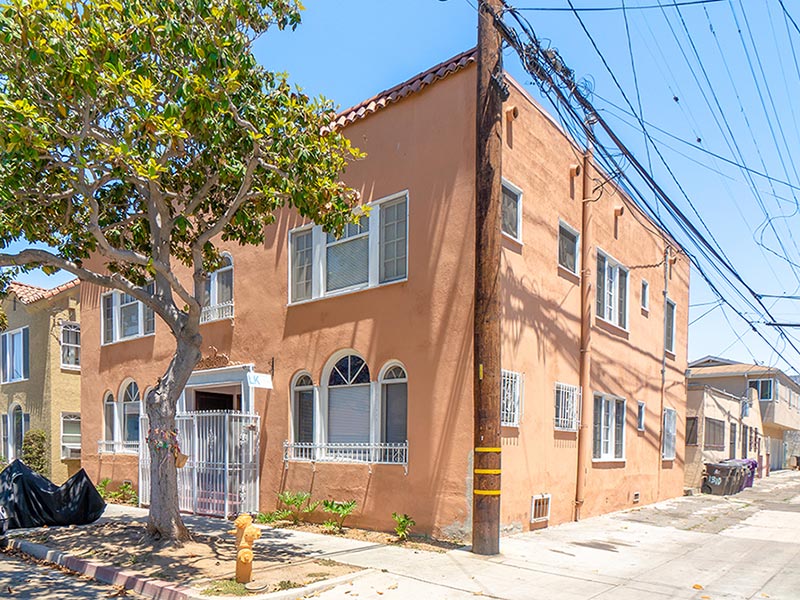So you’re a real estate investor or apartment owner thinking about selling your apartment building. There’s a ton of options, lots of agents, and lots of brokers who would love to work with you. What do you do?
You’re probably receiving daily calls from brokerages and agents telling you that your property is worth so much, and maybe they tell you it’s worth more every single month. You’re getting postcards and mailers… You’re getting targeted on social media from various companies, and you don’t know what to do or what direction to go.
You’re probably thinking about selling your property, because well, it’s actually worth more now than it’s ever been worth before. There’s a lot of interest about this topic from apartment owners. We’re still in the middle of a pandemic. There’s new rent control laws, the eviction moratorium, the “exodus” from California, and maybe just maybe, it’s time to retire. Maybe it’s time to go out of State or maybe you’re done with the depreciation of your asset and your CPA has indicated this might be a good time to sell.
In this blog post, for the first time in the history of real estate, I’m going to be revealing the secrets of the multifamily real estate industry. Nobody ever talks about it, and I believe both real estate professionals and investors need to know this information. Today we’re going to talk about the questions, the attributes, and what to look for in the right real estate agent, so that you choose the right professional to represent you and your apartment building when selling.
Why should you listen to what I’m saying? Yes, I am a real estate broker, but first and foremost, I am an apartment owner. I was able to purchase my first apartment building when I was 23, fresh out of college. So I know what it’s like to deal with tenants. I know what it’s like to get the calls from real estate brokers. I know what it’s like to get vacancies and deal with rent collections. I’m part of the local Apartment Association as well, so I’m heavily involved in the daily transactions of apartment ownership, and I can certainly relate to you.
Why do you need a real estate agent when selling your investment property or apartment building?

Some of our clients have thought about selling their property themselves, which we highly discourage, because you need to go with the right agent who has the proper experience with negotiating every day, dealing with brokers, and dealing with buyers and appraisers. If you haven’t done anything like this in the last 10 or 20 years, then why would you choose to sell your biggest asset on your own, versus having a professional assist to maximize that value?
Why do you need a good real estate agent when selling your investment property?

First off, when you go with a true professional (someone who is experienced in what they’re doing), they’re truly passionate about what they do.
A true real estate professional:
- Can properly evaluate your property so it sells at the right price when it goes active on the market.
- Needs to be able to market and sell your property in terms of: its highlights, its income, its location, and its tenant base.
- Understands your investment property and the process of how to properly sell it.
The right real estate agent for you is someone who can get you out of sticky situations that often occur during the transaction, and the right agent will make this a smooth process with the least headaches.
Oftentimes, when a property hits the market and I’m looking through the property details on the MLS (Multiple Listing Service), I see a lot of mistakes that bad agents make. They often don’t do a good job with describing the property. How many bedrooms? What’s the income? What’s the Gross Rent Multiplier? What’s the Cap rate? What are the property’s expenses? Instead of having 30 or 40 photos like we normally do, they have one blurry photo shot with their smartphone. The things that these unqualified agents are doing, simply don’t help when selling your property. That’s why choosing the right agent is super important. This is considered one of the most stressful situations that most real estate investors and apartment owners get themselves into, so you need someone who has the experience and knowledge to guide you through the transaction proceeds with minimal speed bumps, while selling your property quicker and for more than what it’s worth.
The Five Different Types of Real Estate Agents or Brokers You’ll Encounter When Selling Your Investment Property
As an apartment owner or investor thinking about selling your property, you’ll most likely bump into these agents:
1. The “Out-of-Area” Agent (Opposite of a Hyper-Local Expert)

In most scenarios, apartment owners make the mistake of hiring an the out-of-area agent who isn’t familiar with the location of your property. Maybe it’s because they’re a friend or a family member. They most likely say, “Sure, I can sell your apartment building! I’ve sold a few homes, and that’s not a problem.” But they live somewhere else; not in the same city as your apartment building so they don’t understand the dynamics of your city. What you actually need is a hyper-local expert who knows the intricacies of the area in which your property is located.
2. The Residential Real Estate Agent

The second mistake that I see oftentimes is hiring a single-family home realtor or residential real estate agent, who you trust (and I’m sure is good at selling homes), but knows nothing about income producing properties. Selling apartment buildings and investment properties is a completely different ball game compared to selling residential single family homes!
Here’s an example: When we list an apartment building for sale, agents and buyers usually ask how we determined with the value of the property we’re selling. The same scenario applies when I’m helping a client buy an apartment building. On most occasions, I come across an investment property that is listed by a residential real estate agent. Unfortunately almost all of the residential agents I’ve dealt with don’t understand what a Gross Rent Multiplier means (Hint: It is the ratio of the price of a real estate investment to its annual rental income before accounting for expenses such as property taxes, insurance, and utilities).
These agents often don’t even know what a Cap Rate is how to calculate it (Capitalization rate or a snapshot in time of a real estate property’s ROI). They usually don’t know other important details such as the Net Operating Income of the property they’re trying to sell.
So oftentimes we find listings that are missing gaps of information or the agent is unable to sell it from a financial perspective, because guess what? They don’t sell income properties. They simply sell houses, which they’re good at that but is simply not their specialty. So I think it’s crucial that you, as an apartment owner and real estate investor, work with a multifamily real estate professional who lives in the area and specializes in these types of residential income and investment properties.
3. The Agent Who Misleads You About the Value of Your Property

Yes! I’m actually saying it and revealing this industry secret: Many real estate brokers utilize this phony tactic to earn the business of apartment owners like yourself. They mislead you into thinking that your property is worth way more than what the market can bear.
Here’s another example: A common fourplex in Long Beach, CA usually sells for an average of $1.1 million. Sometimes we see fourplex properties listed for $200,000 to $300,000 above what it should sell for, and I’m left dumbfounded wondering, “why would they do that?” How did they come up with this inflated price? Then what ends up happening is the exaggerated price ultimately causes the property to sit in the market without being sold, and eventually turns into an expired listing.
4. The “Discount” Real Estate Broker

Here’s another industry secret: Another tactic average real estate brokers implement to earn your business is to simply reduce their commission fees. This is someone that we refer to as a “discount broker.” A discount broker simply tries to grab the property listing by reducing their fees, but they’re not exactly equipped to sell investment properties like apartment buildings.
This is someone who will get your attention because they’re going offer you a 1% listing fee as a bait. What they’re essentially saying is: “I don’t know how to stand out or do a better job with selling your building, so I’ll simply just lower my fees.” If someone who’s willing to lower their fees so quickly considers that the first negotiation, then what are they gonna do in the middle of a real negotiation when they’re sitting across from someone like me? Hint: Your property either won’t sell, or they’ll sell it below a price you won’t like.
It doesn’t always mean that they’re the best broker in the area. It doesn’t mean that they have the best marketing strategies for your property. It doesn’t even mean they have the best database of buyers. All they’re offering you is a low fee. That’s it!
In the end of the day, whenever I see in that type of poor representation by an agent, the seller never wins.
5. The Part-Time Real Estate Agent

This final breed of agent is the most common: someone who only does real estate part-time. There’s a ton of real estate agents in our industry that do this as a “side hustle” or a hobby. For them, it’s not a business. It’s not a profession. They just satisfied with doing a deal or two every year.
Certainly this person is not able to negotiate on your behalf. When you’re selling a building, it’s sometimes a common misconception to think that there’s only one negotiation involved (about the purchase price). In fact, there’s actually 20 to 30 different negotiations that go on from start to finish in a complete multifamily property sale or transaction.
So the ideal agent you want to work with is someone who negotiates on a daily basis, who is familiar with this type of investment asset, and someone who can best guide you through the different facets of the transaction.
What Characteristics to Look for When Choosing the Right Real Estate Agent or Broker to Sell Your Property

1. They Must Be a Multifamily Real Estate Expert.
There are various breeds of licensed real estate agents out there. In the industry, we often joke around about how when you’re born you’re given your birth certificate and a real estate license. Just like doctors, the field of real estate has many intricate specialties.
- The most common agent you’ll find is the residential agent; one who simply focuses in helping people buy and sell single family homes.
- There are folks who specialize in multifamily properties, (duplexes, triplexes, fourplexes, and above) like ourselves at Sage Real Estate.
- Then there are commercial real estate experts who specialize on either industrial, office, retail, etc.
It is critically important to be aware of the different types of real estate professionals when choosing the right agent to sell your property.
2. They Must Be Qualified Experts
Similar to professional athletes, whether it’s baseball or football, everyone in the real estate industry has their own statistics with which they measure success and performance. Just like how coaches use statistics to pick their best players, you also need to use statistics to pick the right real estate agent for you.
In a later section below, we’re gonna give you the actual questions you should be asking, so that you can determine whether they’re qualified to sell your property or not.
3. They Must Be Hyper-Local Experts of Your Area
After you’ve determined whether the agent you’re interviewing is qualified or not, you need to figure out if they are an expert in the area your property is located. Do they know the area? Do they live in the area? The value of a property is heavily influenced by its location, and only a local expert will know that.
Having a real estate agent who has their boots on the ground with insider knowledge on the different markets, the different neighborhoods, the rents, and what’s going on in the area could give you a real advantage.
4. They Must Be Trustworthy Enough to Care About You
The reality is a lot of agents in the industry that we’ve worked with, are simply in it for the commission. That’s the plain truth. Once the transaction is done, they take their commission and move on to the next deal. If you want a smooth and painless real estate transaction, you need a professional who cares about more than just the commission.
For example: An approach that we have adopted at Sage Real Estate that’s quite different is we’ve built a community of investors and apartment owners, and educate them on all kinds of topics relevant to them before the transaction. During the transaction, we certainly do the best job possible so it’s as a smooth transaction as it can be. Then once it’s closed and done, we’re still there as a resource for them in case they need help.
Interview Questions to Ask When Choosing a Real Estate Agent to Sell Your Property

Now that you know the four characteristics to look for when choosing the right agent, we’re going to give you the questions to ask the agent you’re interviewing to make sure that they are the right person for the job.
Questions on How to Figure Out the Real Estate Agent’s Performance Statistics
Just like I mentioned earlier, every real estate professional needs to know their performance statistics similar to how professional athletes do. In the realm of multifamily real estate, these are the questions you need to be asking:
- In the last 12 months how many apartment buildings have you sold in this specific area?
- What’s the ratio between the Actual List Price the Actual Sold Price of the properties you’ve sold?
- And on average, how long does it take you to sell a property?
When you’re asking these questions, a true professional should have these statistics and be able to show you what they are. If they’re not prepared, maybe they’re not the right person for the job.
Do you present yourself as a multifamily expert or residential agent?
Oftentimes apartment owners make the mistake of hiring the person who sold them a home and then they reach out to them asking, “Hey can you help me with my four-unit building?” Naturally the agent is going to say yes, but are they the right fit? How many apartment buildings have they sold? Is that really their specialty?
Do you own any apartment buildings?
As an apartment owner myself, I personally think it’s critically important to ask this. A real estate agent who presents themselves as a multifamily real estate broker must own apartment buildings and know the ins-and-outs of everything having to do with apartment ownership. This will play a crucial role in the success of selling your building.
Do you live in this area?
Do they know the restaurants that are nearby? Do they know the rents that a one-bedroom unit is can command in different areas? Are they aware of the various type of tenants willing to rent the property? Do they know the amenities that the tenant is looking for or the lifestyle that the area provides? All important questions that matter when figuring out the property’s true value and the ideal target buyer when marketing it. These are details that will only be apparent to someone who lives in the area.
How many expired listings have you had in the last 12 months?
A listing becomes an “expired listing” when that property sits on the market and does not sell. There are certain real estate agents in our industry who have a large amount of expired listings. Why is that the case? Do they not know how to properly evaluate a property? If that’s the case, why are they in real estate? Are they overpricing properties? Are they not marketing your property correctly?
If you’re interviewing someone and they have a large number of expired listings, that should be a red flag! The point of listing a property is to sell it. We see it over and over again: overpriced multifamily properties that don’t sell. In this case the apartment owner was either under-served or misled on the pricing of their property.
It’s never a happy situation when a property doesn’t sell. You’ve wasted three to four months sitting on the market, when it could’ve sold sooner, but instead the property is still yours. And the real estate agent simply left a bad taste in your mouth.
What experience do you have on dealing with tenants?
This is critically important as the tenant plays a really important role in the actual facilitation of the sale, whether it’s a four-unit building, a two-unit building, or even an eight-unit building. During the process of selling an apartment building, you’re going to need to ask any tenant permission for the agent to enter the unit for five to eight times throughout the transaction.
With a 24 hour notice the tenant must allow access, but oftentimes if it’s not done properly, the tenants can refuse access; therefore slowing down or essentially stopping the sale.
It’s important that the real estate agent has the ability to relate to the tenants and know how to communicate with them. Sometimes it helps to be bi-lingual and communicate in their language, to let them know that everything’s gonna be okay. Tenants in this situation tend to be super fearful assuming that they’re gonna be asked to move. Who’s gonna be the new owner? Are they gonna raise my rent? Can I trust the new owner?
So from the very beginning, it’s important that the agent with the right demeanor puts them at ease. When they are able to accomplish that, the tenant will be more lenient throughout the transaction during 5 to 8 times when we need to take photos, schedule inspectors, perform walk-throughs, do roof inspections or garage inspections, and final verification. So it’s super important to hire a good agent who can navigate the process with the tenants so that we could avoid any issues throughout the sale.
Are you bilingual?
In certain areas there will be a higher concentration of Spanish-speaking tenants. In those areas, such as Long Beach or San Pedro, it’s definitely helpful to have a bilingual real estate agent.
How do you plan on marketing my property?
There are usually two things that most owners want when selling a property:
- How quick is my property going to sell?
- How much is my property going to sell for?
It’s a major red flag if the agent you’re interviewing is simply content with utilizing archaic and traditional marketing methods (cold-calling buyers, sending mailers, or listing it on the MLS), and they’re not willing to try modern effective methods such as video or paid digital advertising to market your property at its full potential.
How well do you understand the financial analysis of a property?
Multifamily real estate is all about residential income-producing properties. If you’re selling an income-producing property, the person you’re hiring should be really good at this. So when you ask them questions such as, “tell me about the Cap Rate in this area,” what you’re asking them is: “What’s a rate of return in this area that an investor is willing to purchase this property?” Then see what their response is.
You don’t need to be an expert to know the context of their response. If it’s a detailed response and they know the numbers, then great! If they don’t, then we have more concerns. Maybe they’re not the specialist they claim to be.
- What is the Gross Rent Multiplier for my property? What do you suggest it should be?
- What’s the cash-on-cash return for the buyer?
Who is the ideal buyer of my property?
A real estate agent who is a true professional with marketing a multifamily property would know the answer to this question. Is the buyer an owner-user (someone who lives in one of the units and rents out the rest)? Is the buyer an investor?
What type of listing agreement we signing together?

There are two types of listing agreements that you typically would be signing when you approach a real estate agent to sell your building:
- The first one is a listing agreement approved by your Association of Realtors. Here in California we use the California Association of Realtors Listing Agreement, which is more objective and protects both the agent and client.
- The second is used by much larger brokerage firms, which is typically drafted in-house by their in-house attorneys.
After reviewing both types of listing agreements, we’ve found that the latter is much more favorable for the listing broker, and not so much for you, the apartment owner. So when it comes to listing agreements, use the one that is nationally approved by the National Association of Realtors or your state, instead of a private listing agreement that will not be as favorable for you.
What other value do you bring apartment owners outside of a transaction?
I truly believe this is important because we want to find out whether are they an average agent (just in it for the commission), or they a true professional who cares about you enough that you can trust them.
For example: Here at Sage Real Estate what we’ve done is create this community, where we do everything to educate, to guide and to be a resource to apartment owners and investors. We have this community where a lot of folks simply call us with property management questions, questions about the Amnesty Program that was just passed, or questions about accessory dwelling units. We’re here as a resource on what proper forms they need to use or what to do during certain scenarios.
We’re here before the sale, during, and certainly after. I think that’s what truly separates us from the rest of the brokerages we’re competing against. In Long Beach, California, we sell more fourplexes than anybody else. So we certainly understand our market better. We know the sellers, we know the type of buyers for it and certainly the financing that is necessary. Because of that, we’ve been able to sell for 10% more and 10 times faster than average.
We certainly know our ratios, so if you find someone that’s like us: who is an expert in multifamily real estate, who’s qualified to do the work, who’s an area expert, and someone who has earned your trust, then that’s who you should work with.
You’ve now found the right agent. You now know the right steps and the right questions to ask when finding the right agent to sell your property. Again, because when you do, you’ll have a smooth transaction, you’ll sell for more, and you’ll sell faster.
So there you have it! I hope you enjoyed this blog post. If you have any questions, feel free to reach out!







